Despite the scale of voter bribery and misuse of administrative resources is not as wide as in 2012, these violations remain major issues of the election process in Ukraine.
[1]OPORA has already detected 63 incidents having features of voter bribery and 35 incidents characterized as misuse of administrative resources.
Characteristics of voter bribery were noticed in campaigning efforts of 52 electoral subjects (candidates and parties) in 44 of 213 single-mandate districts. Almost 70% violations related to the voter bribery were noticed in activities of self-nominated candidates. The most popular method of voter bribery was dissemination of preferential or free goods and services (38 of 63 incidents).
Self-nominated candidates are involved in almost 30% misuses of administrative resources. Most candidates that misused access to state authorities were campaigning on official events, organized by government bodies, state or communal enterprises, what is against the Law (20 of 35 incidents). Misuse of administrative resources is not widespread, what makes 2014 elections more competitive.
As long as the Parliament refused to improve the legislation and change the electoral system, we can see negative experience of 2012 elections returning in this election campaign. Law breakers are left unpunished and law-enforcement bodies remain inefficient. As a result, candidates use illegal campaigning methods. Despite candidates and parties bribe voters and misuse administrative resources less than in 2012[2], the reported incidents show that many candidates are ready to gain the victory by illegal means.
On 14 October 2014, the Verkhovna Rada of Ukraine adopted amendments to the Criminal Code of Ukraine related to strengthening liability for violation of citizen voting rights. These amendments establish voter bribery as a separate crime, and provide criminal liability for both individuals who give bribe and who take. However, the Parliament adopted them only in the end of the election campaign, what allows candidates to avoid responsibility for violations that are already committed. OPORA calls the President of Ukraine to urgently sign amendments to the Criminal Code of Ukraine in order to prevent violations on the last days of campaign, the voting day, during vote tabulation, and determination of election results in districts.
VOTER BRIBERY IN EARLY PARLIAMENTARY ELECTIONS IN UKRAINE
As of 10/14/2014, OPORA's observers reported 63 incidents of voter bribery committed by candidates and parties. Most of these incidents (44) were detected in campaigning efforts of self-nominated candidates. Candidates nominated by the Petro Poroshenko Bloc (6 incidents), the People's Front (6), AUU Batkivshchyna (2), the All-Ukrainian Agrarian Union Zastup (2), the Strong Ukraine party of Serhii Tihipko (2), the Opposition Bloc (1) were rarely noticed in incidents related to voter bribery.
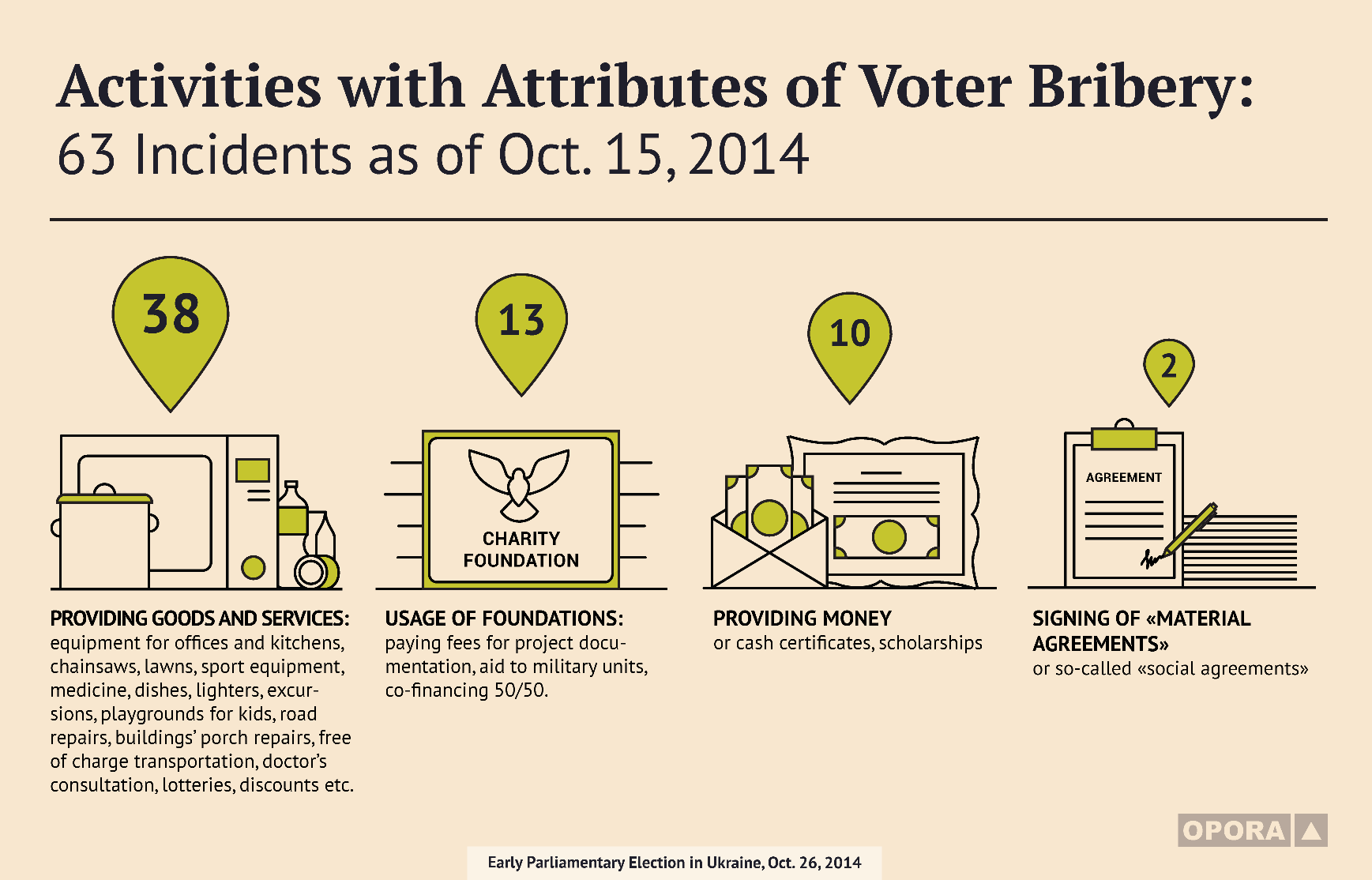
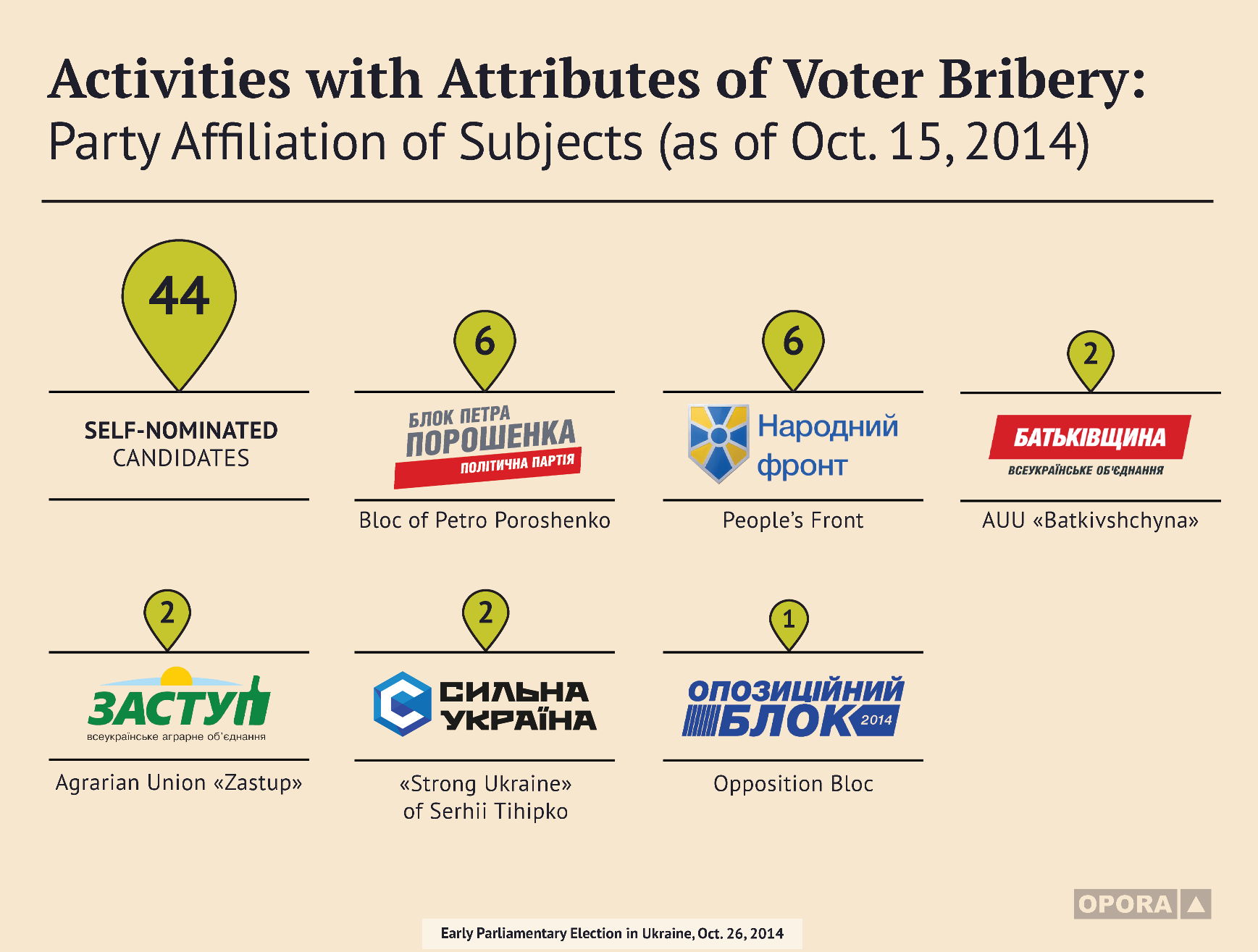
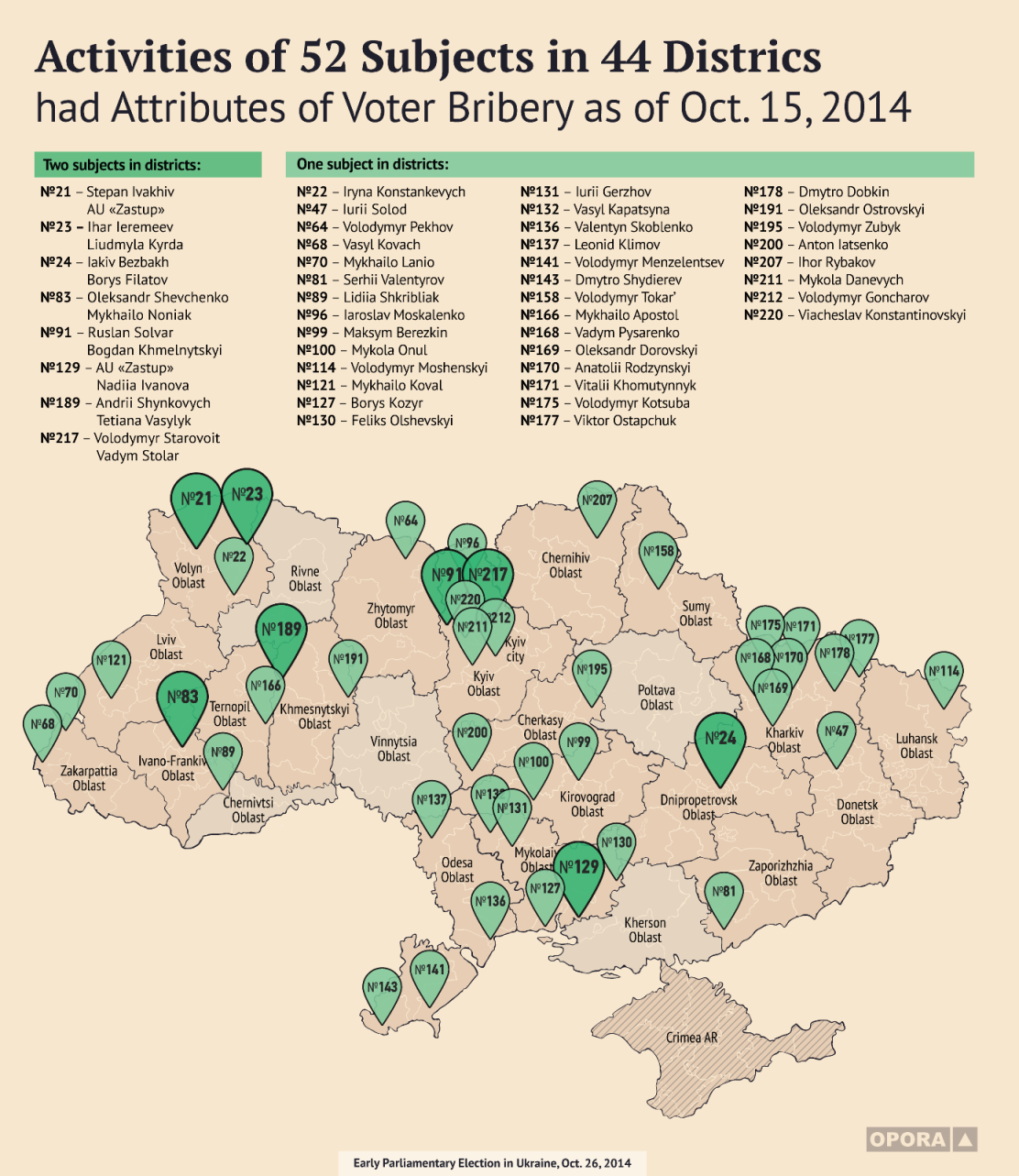
Incidents of vote buying usually included providing the voters, institutions, establishments, and organizations with free or preferential goods, services, works, lotteries and other material (non-cash) values, characterized as indirect bribery of voters. Such type of bribery was noticed in 38 incidents.
The range of goods and other material values, used by candidates as incentives for voters, is very broad. For example, Vitalii Khomutynnyk (SMD #171, Kharkiv obl.), Nadiia Ivanova (SMD #129, Mykolaiv obl.), Ihor Rybakov (SMD #207, Chernihiv obl.) and some other candidates disseminated product sets as a part of campaign.
The voters received different free or preferential goods or services from a number of candidates or other persons campaigning for them:
- free public transport– Ruslan Solvar (SMD #91, Kyiv obl., Petro Poroshenko Bloc), Valerii Moshenskyi (SMD #114, Luhansk obl., self-nominated);
- free excursions– Volodymyr Zubyk (SMD #195, Cherkasy obl., self-nominated);
- medicines and medical services– Valentyn Skoblenko (SMD #136, Odesa obl., self-nominated), Oleksandr Dorovskyi (SMD #169, Kharkiv obl.), Mykhailo Apostol (SMD #166, Ternopil obl.);
- discount goods– Yakiv Bezbakh (SMD #24, self-nominated), the Agrarian Union Zastup (Mykolaiv obl.), Volodymyr Tokar (Sumy obl., SMD #158), Dmytro Shydierev(SMD #134, Odesa obl., self-nominated) and others.
Similarly to 2012, candidates in single-mandate districts implement projects goaled for improvement of local infrastructure (repairing roads and premises of social institutions, arrangement of surrounding area, street lighting etc.): Anton Yatsenko (SMD #200, Cherkasy obl., self-nominated), Valerii Pysarenko (SMD #168, Kharkiv obl.), Oleksandr Shevchenko (SMD #83, Ivano-Frankivsk obl., the Petro Poroshenko Bloc), Volodymyr Honcharov (SMD #212, Kyiv city), Vadym Stolar (SMD #217 Kyiv city) and others. However, the voters cannot tell additional resources attracted for local problems from resources allocated on state or local programs used for popularization of the certain politicians.
Goods, services, and equipment for social institutions, establishments and organizations were provided by or on behalf of the following candidates: Volodymyr Pekhov (SMD #64, Zhytomyr obl.) Yaroslav Moskalenko (SMD #96, Kyiv obl.), Mykhailo Lanio (SMD #70, Zakarpattia obl.), Vasyl Katsapyna (SMD #132, Mykolaiv obl.) and others. Besides that, MP candidates gained full benefit of the Day of Education Sphere Employees, celebrated on the first Sunday of October in Ukraine. Thus, candidates visited celebrations to give educational establishments and their employees valuable gifts - computers and other equipment.
The second top type of bribery was the use of charitable funds in campaigning purposes (13 violations). Charitable funds can either openly associate their activities to the certain candidate, or conceal the source of "charitable help". Observers reported a number of charitable funds functioning during the election process, that are directly or indirectly related to Stepan Ivakhiv (SMD #21, Volyn obl., self-nominated), Iryna Konstankevych (SMD #22, Volyn obl.), Ihor Yeremeiev (SMD #23, Volyn obl., self-nominated), Yurii Solod (SMD #47, Donetsk obl., the Opposition Bloc party), Serhii Valentyrov (SMD #81, Zaporizhia obl., self-nominated), Mykhailo Apostol (SMD #166, Ternopil obl., the People's Front) Dmytro Dobkin (SMD #178, Kharkiv obl.) and some other candidates.
OPORA's observers reported 10 incidents when candidates and parties gave money to the voters as a part of campaigning efforts or in the other way. The most resonant incident was when the voters received 500 UAH for, allegedly, dissemination of one copy of campaigning newspaper of the All-Ukrainian Agrarian Union Zastup. This incident was recorded on video and published by the OPORA[3].
The voters could also receive money, awards, or monetary certificates during events organized in support of the following candidates: Stepan Ivakhiv (SMD #21, Volyn obl.), Mykola Onul (SMD #100, Kirovohrad obl., self-nominated), Ruslan Solvar (SMD #91, Kyiv obl., the Petro Poroshenko Bloc), Andrii Shynkovych (SMD #189, Khmelnytsk obl., self-nominated), Tetiana Vasylyk (SMD #189, Khmelnytsk obl., self-nominated), Ihor Yeremeiev (SMD #23, Volyn obl., self-nominated), Liudmyla Kyrda (SMD #23, Volyn obl., AUU Batkivshchyna), Volodymyr Pekhov (SMD #64, Zhytomyr obl.), Leonid Klimov (SMD #137, Odesa obl., self-nominated). With monetary certificates, voters could receive the certain goods or services from charitable or other organizations for the monetary value of such gift certificates.
Establishment of efficient legal restrictions preventing the voter bribery, and effective mechanisms of bringing to liability for the abovementioned violations are two continuous problems of Ukrainian legislation. According to the Article 74(14) of the Law of Ukraine on Elections of People's Deputies of Ukraine, it's prohibited to provide the voters, establishments, institutions, and organizations with money, free and preferential goods and services as a part of campaigning efforts. Such campaigning activities are classified as indirect voter bribery. As an exception to this restriction, it's allowed to disseminate items bearing name, symbol, or flag of a party, provided that the value of such items does not exceed 3% of the minimum salary (less than 38%)[4]. If the court rules that money, goods or services provided to the voters, establishments, institutions, organizations or commission members by an organization, established, owned or led by MP candidate, party that nominated a candidate or officials of this party, can be classified as the voter bribery, the CEC can give warning to such party or the candidate himself[5].
As you can see, even after the fact of voter bribery is confirmed by the court, the CEC cannon cancel registration of a candidate.
The effective wording of the Criminal Code establishes responsibility for impeding free exercise of the voting right related to the bribery (Article 157). The given paragraph of the Criminal Code doesn't give enough detailed definition of bribery as a constituent element of a crime. Besides that, inconsistency of the Code and the Law of Ukraine on Elections of People's Deputies of Ukraine complicates practical realization of sanctions for the voter bribery. If the President of Ukraine signs amendments to the Criminal Code adopted by the Parliament on 10/14/2014, voter bribery will receive detailed definition, and the liability for this crime will broaden[6]. According to the Constitution, a law which establishes or strengthens responsibility has no retroactive effect. Thus, OPORA calls the President of Ukraine and the Chairman of the Verkhovna Rada to urgently sign this bill. If it's signed after 15 days, it won't be used to punish guilty of voter bribery in this election campaign[7].
ADMINISTRATIVE RESOURCE IN EARLY PARLIAMENTARY ELECTIONS IN UKRAINE
In the last regular elections to Ukrainian Parliament in 2012, OPORA reported consolidated misuse of administrative resource, used in the interests of the certain political party and its candidates in single-member districts. Misuse of administrative resources in the interests of the ruling party included not only participation of public officials in campaigning efforts, but also wide-scale use of budget program resources for electoral purposes. In comparison to 2012, the administrative resource is not systematically used in this election campaign, but divided between representatives of different political parties that are electoral subjects, and candidates in single-member districts. Budget programs (projects) and state financial resources were not used widely for campaigning purposes in this election campaign, making the quality of 2014 Parliamentary elections higher if compared to previous campaigns. However, some high and local officials do violate the law by abusing their powers.
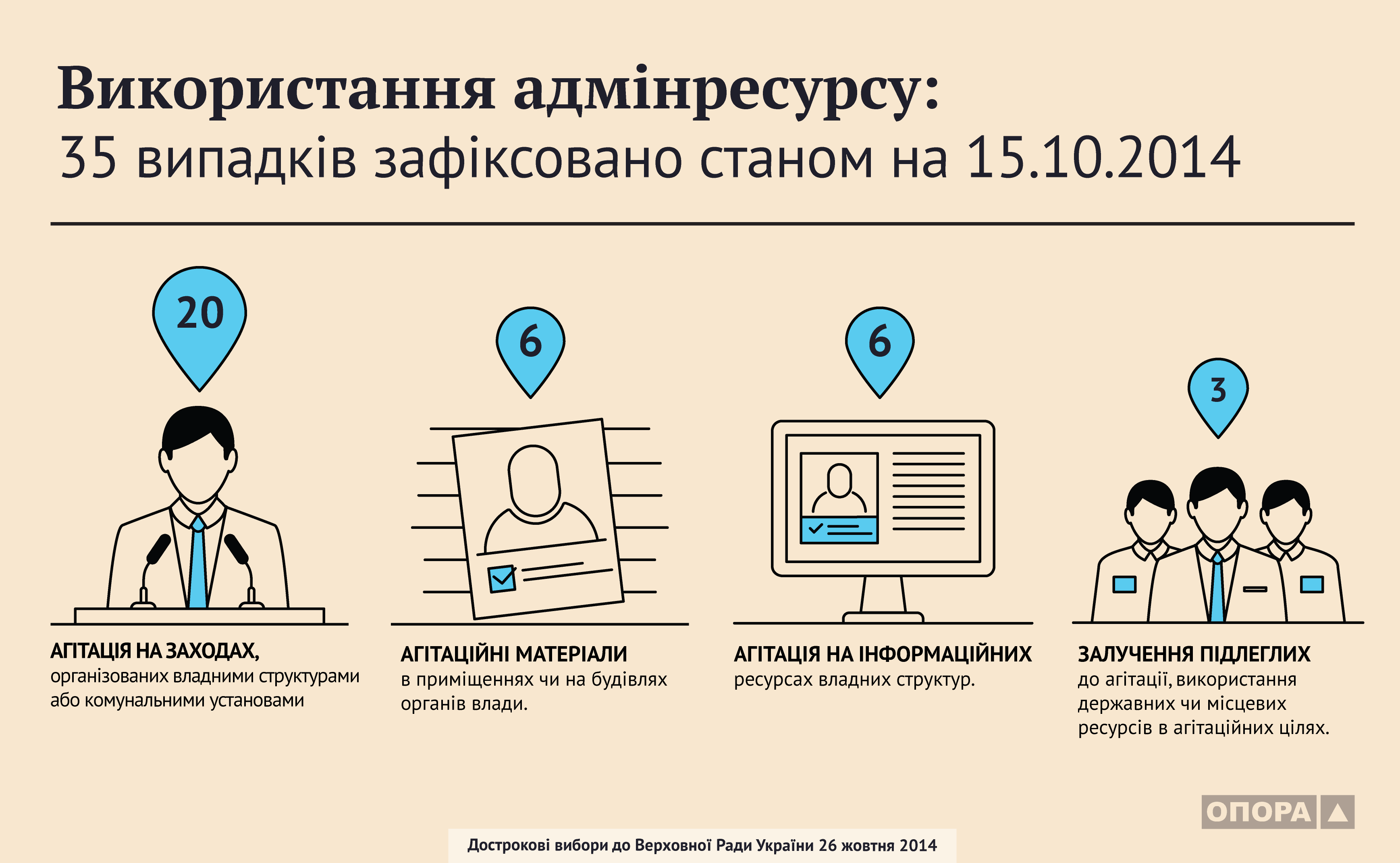
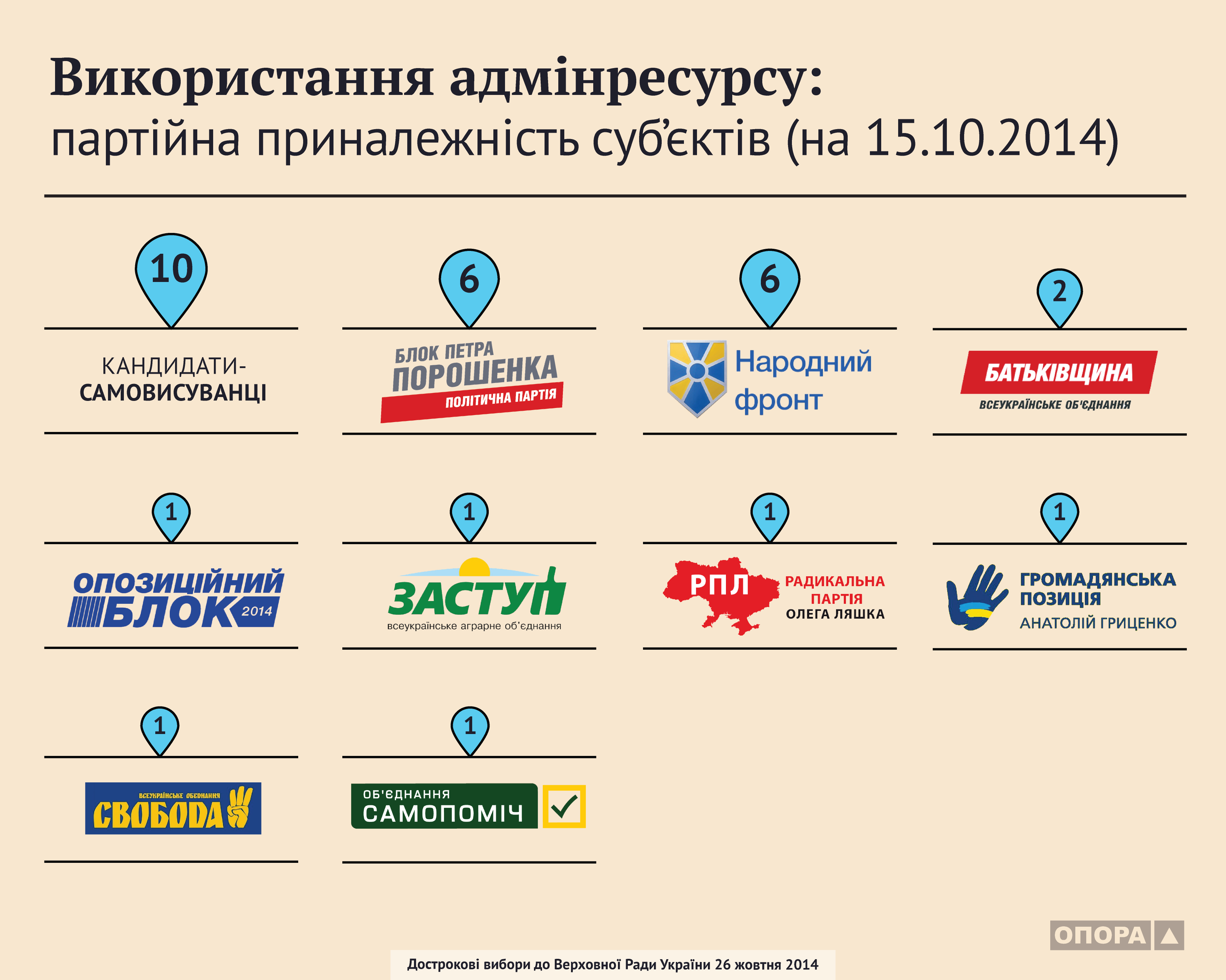
OPORA understands the term "misuse of administrative resource" as the use of state authorities and resources by parties or politicians for their benefit in the election campaign. Such definition of the administrative resource within electoral framework is based on regulations of international legal acts, covering the problem of powers and authorities abused to obtain any illegal benefit or the benefit for other physical or legal entity[8]. Misuse of administrative resource in the election process includes inobservance of the principles of politically impartial state apparatus through institutional, budget, force, legislative, regulatory, media resources etc. Although it's impossible to enlist all types of administrative resource in the electoral legislation, adherence to the principle of equal opportunities for electoral subjects should be secured for a qualitative electoral process.
As of 15 October 2014, OPORA has already detected 35 incidents characterized as misuse of administrative resources in this election campaign. Self-nominated candidates misused the administrative resource the most often (10 incidents). Representatives of the Petro Poroshenko Bloc and the People's Front were involved in 6 violations related to the misuse of administrative resource. The AUU Svoboda, the Opposition Bloc, the All-Ukrainian Agrarian Union Zastup, the Civic Position (Anatolii Hrytsenko), and the Radical Party of Oleh Liashko were involved only in one incident.
Most candidates violated the prohibition of campaigning on official events, organized by government bodies, local self-government bodies, state or communal enterprises, establishments, institutions, and organizations (Article 74(2) of the Law of Ukraine on Elections of People's Deputies of Ukraine). OPORA has detected 20 such incidents. The following candidates were campaigning on official events of government bodies: the Minister of Infrastructure of Ukraine Maksym Burbak (SMD #204, Chernivtsi obl., the People's Front), the Minister of Education and Science Serhii Kvit (included in party list of the Petro Poroshenko Bloc), Deputy Minister of Foreign Affairs of Ukraine Danylo Lubkivskyi (SMD #118, Lviv obl., self-nominated). These violations involve mostly regional and local officials.
Observers reported that campaign materials were placed inside or outside the premises of government bodies, state or communal institutions, and campaigning on information resources of government bodies at all levels (6 incidents). For example, OPORA's observers noticed campaigning materials in premises of local government bodies in Kharkiv oblast (Anatolii Denysenko, SMD #174, self-nominated), Rivne oblast (AUU Svoboda), Zakarpattia oblast (Oleksandr Dovhosh, SMD #68, the People's Front) etc..
Local government bodies often placed campaigning materials (Pervimaisk City Council in Mykolaiv oblast, Cherniakhiv Raion State Administration in Zhytomyr oblast, Lebedynsk City Council in Sumy oblast, and some others).
Sometimes, officials who registered as MP candidates attracted their subordinates or other officials to campaigning events (Oleksandr Dekhtiarchuk, SMD #154, the Petro Poroshenko Bloc, Volodymyr Hroisman, the Petro Poroshenko Bloc).
Nevertheless, misuse of administrative resources in interests of political parties or candidates isn't widespread. As long as the law doesn't prohibit campaigning during working hours for candidates who hold public office, observers reported a number of violations related to campaigning on official events organized by state authorities, as well as state or communal enterprises. At the same time, the public service reform is still topical for Ukraine, as well as depoliticization of public officials in executive bodies, strengthening of legislative and internal organizational procedures for securing adherence to the principles of political impartiality in state authorities.
CONCLUSIONS
The election process is competitive in all single-mandate election districts. State authorities, local self-government bodies, and law-enforcement bodies do not interfere in the election campaign. Voter bribery, usually initiated by self-nominated candidates, creates substantial threats to free voting process in Ukraine. The current Parliament lacked political will to eliminate negative experiences of the election process borrowed from previous election campaigns through the legislation.
RECOMMENDATIONS
To the President of Ukraine
To urgently sign the Law of Ukraine on Making Amendments to the Criminal Code of Ukraine (related to strengthening liability for violation of citizen voting rights), adopted by the Verkhovna Rada of Ukraine on 10/14/2014/.
To the Verkhovna Rada of Ukraine
After the voting on 26 October 2014, to come back to consideration of bills securing improvement of electoral legislation, including reconsideration of the election system, prohibition on interference of state authorities and public officials in the electoral process, additional separation of activities conducted by public officials and candidates.
To Law enforcing and controlling bodies
To systematically and impartially verify information about voter bribery committed by MP candidates, to keep the public informed about taken measures.
[1] However, we didn't count misuses committed by de-facto candidates that are not registered in the CEC yet. Incidents reported before the official registration of candidates, as well as all violations during the election process are available for your consideration on the Map of violations at http://map.oporaua.org/. OPORA calls the MIA of Ukraine to take the corresponding legal measures in response to information published by the organization on this resource. The information is updated daily.
[2]http://oporaua.org/news/3125-somyj-zvit-za-rezultatamy-zagalnonacionalnogo-sposterezhennja-parlamentski-vybory-2012-zhovten
[3]http://map.oporaua.org/home/volinska-oblast/753-na-volyni-za-poshyrennia-odnoho-prymirnyka-partiinoi-hazety-daiut-pivtysiachi-hryven-video